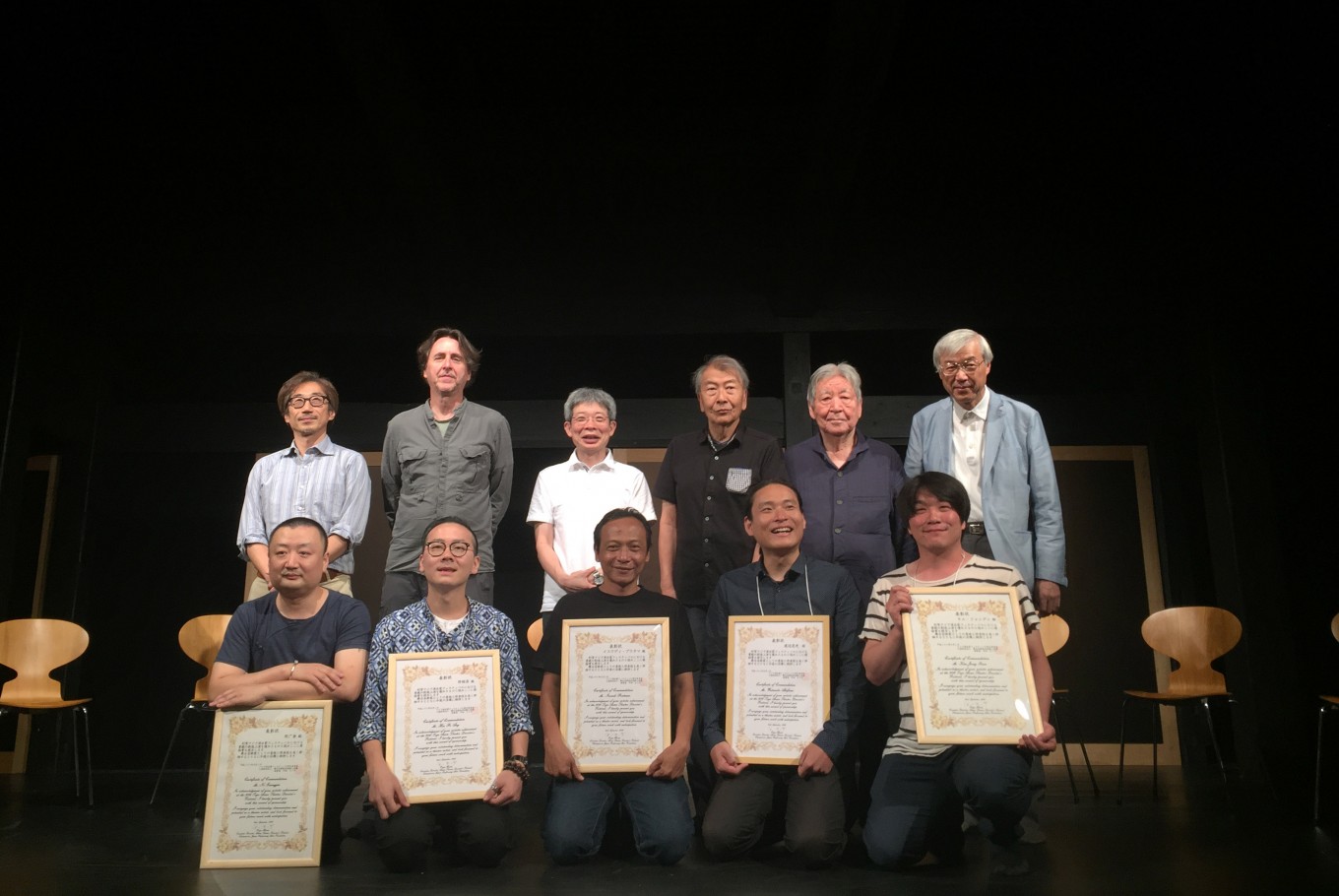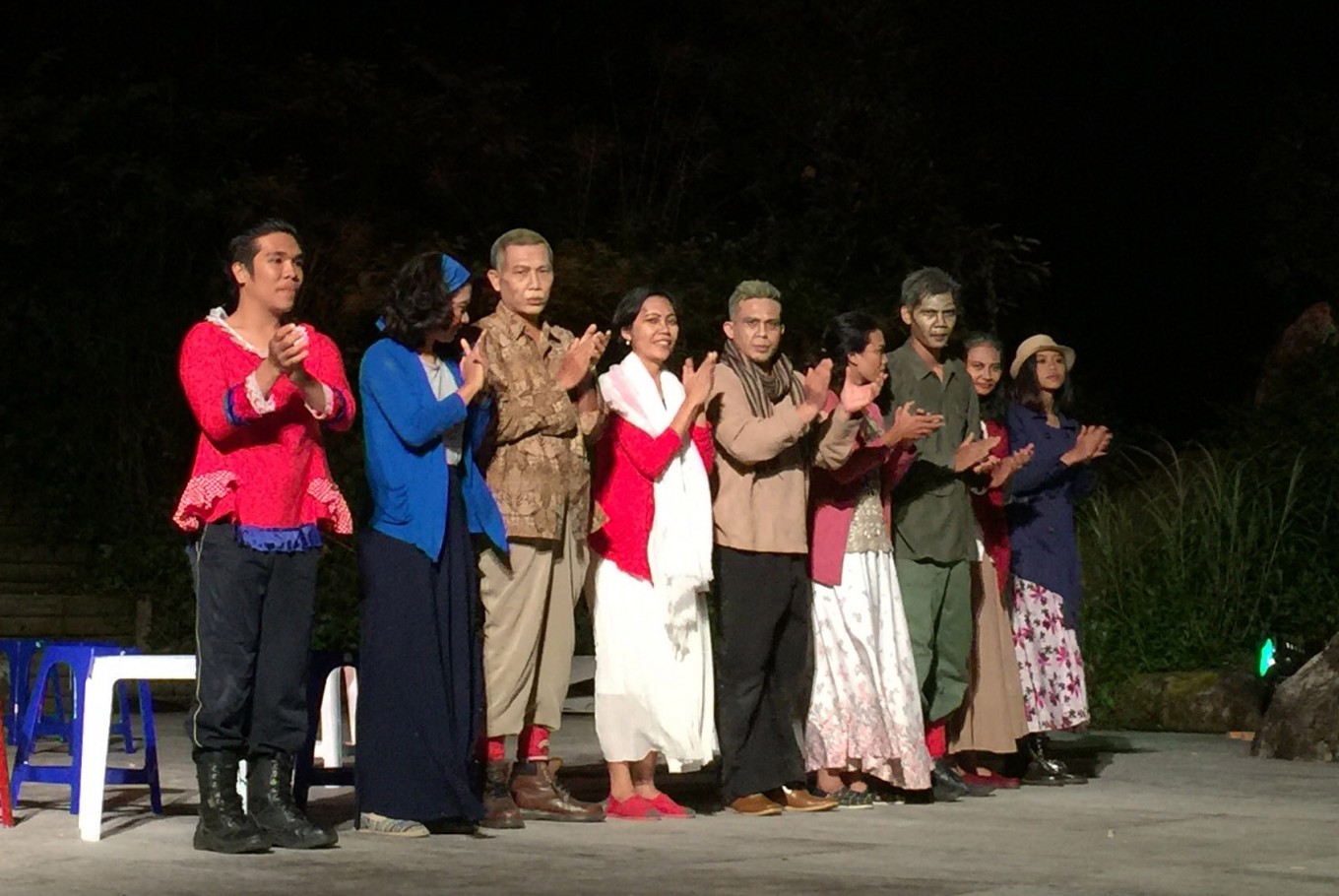Popular Reads
Top Results
Can't find what you're looking for?
View all search resultsPopular Reads
Top Results
Can't find what you're looking for?
View all search resultsIndonesian theater steals the show at Asian theater festival
Lampung-based Teater Satu Indonesia took over the Rock Theater stage on Aug. 31 in the village of Toga, Japan, to perform The Chairs, which was greeted with great enthusiasm by audiences at this year’s Suzuki Company of Toga (SCOT) Summer Season.It was the 41st annual Asian Theater Directors’ Festival and also Indonesia’s first time participating in the festival.
Change text size
Gift Premium Articles
to Anyone
Lampung-based Teater Satu Indonesia took over the Rock Theater stage on Aug. 31 in the village of Toga, Japan, to perform The Chairs, which was greeted with great enthusiasm by audiences at this year’s Suzuki Company of Toga (SCOT) Summer Season.
The Asian Theater Directors’ Festival annually invites a number of young directors from countries around Asia to present the same play. This summer, the selected directors from Taiwan, Japan, China, Korea and Indonesia were given the task of presenting The Chairs, written by Romanian-French playwright Eugene Ionesco.
It was the 41st annual Asian Theater Directors’ Festival and also Indonesia’s first time participating in the festival.
(Read also: Lampung theater troupe to represent Indonesia at SCOT Summer Season 2016)
The original play follows an elderly couple who spend time in an isolated house telling stories every night before setting up chairs for invisible guests who come to hear the man’s important messages for the world.
Using Yudiaryani’s translation of the original script, Indonesian director Iswadi Pratama decided to take a different direction with this play while still managing to capture the essence of Ionesco’s narrative. Unlike the traditional version, Iswadi divided the play into five different fragments, each of which featured two actors, apart from the ending, with one. The nine actors were Imas Sobariah, Ahmad Jusmar, Baysa Deni, Vita Oktaviana, Budi Laksana, Yeli Shinta Laras Utami, Gandi Maulana, Desi Susanti and Rarai Masae.
Iswadi's revival of The Chairs further explored the two characters’ memories, represented as a series of guests coming from different ages in the fragments. But the guests – depicted as a childhood friend, diva, aristocrat and ruler – are in fact a mere illusion that evokes the couples’ underlying emotions. In the end, all four pairs tragically kill each other just before the orator walks in to find their bodies lying on the floor, along with empty chairs.
In the classic production, the orator is presented as someone with the role of delivering the old man’s words of wisdom at the end, though they could hardly be understood as the character turns out to be deaf and mute. But while Ionesco ends his play in a despondent manner, Iswadi chose to see a light at the end of the tunnel through the orator, who concludes all fragments with handing out a rose to the audience as a sign of hope.
Speaking at the festival’s closing ceremony, the director revealed that he wished to express more optimism through the tragic farce: “We still have hope — which translates to spirituality, religion, culture and arts — and just like what Ionesco did in The Chairs [when assigning the orator as the message-bearer], I envisioned such a task being fulfilled by an artist or an orator in this play."
(Read also: Indonesian short film premiers at 2016 Venice International Film Festival)
 Iswadi Pratama (bottom center) and other directors.(Teater Satu/File)
Iswadi Pratama (bottom center) and other directors.(Teater Satu/File)
Despite taking a risk by relying on such an unconventional approach, Teater Satu’s The Chairs brought delight to its international audience. One audience member said she was particularly amused to see several actors playing the two characters.
In a personal interview, Yanghee Lee — who is also a dancer residing in New York — shared one of her favorite parts of the play. “I still remember one point; there was a dramatic moment where the man and women just fell down and at the moment the nature was so windy [and] I was like ‘whoa!’ The whole scene was very beautiful for me and I could still remember I could absorb everything, I could feel their presence and emotions.”
Aside from the general audience, many critics also applauded Iswadi's work for bringing something completely different and original to Ionesco’s absurdist drama. “I think the direction has some interesting insights, some interesting ideas because dividing the text into many couples was working on the stage, even if it was for me a bit too naturalistic. And the transition using the memory like a nightmare was for me very interesting, which showed the loneliness of the people on stage,” Italian critic Sebastian said during a discussion session.
The Asian Theater Directors’ Festival was officially closed on Sept. 2 with all the directors receiving certificates and grants of ¥500,000 (US$4,906). Participants got to enjoy the rest of the SCOT Summer Season by watching performances directed by Japanese theater director and festival organizer Tadashi Suzuki.
Caranissa is an editor at Indonesia Expat. She occasionally writes, dances and performs on stage.
---------------











